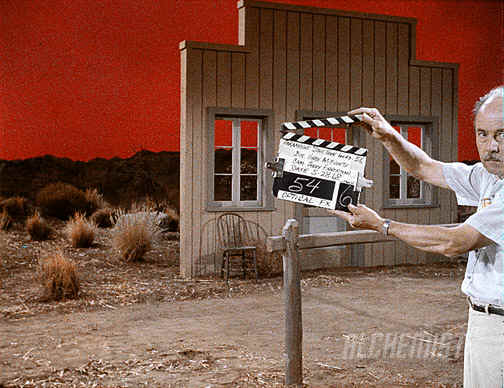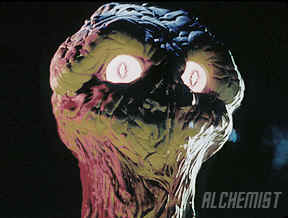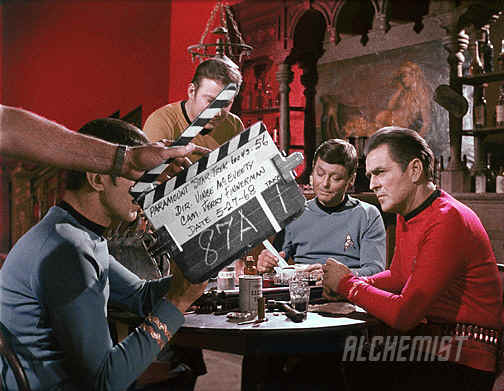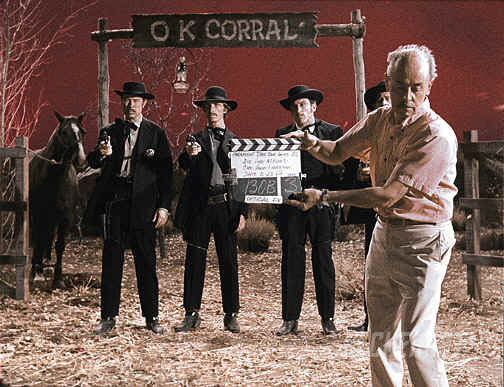

written by Lee Cronin (pseudonym of Gene
L. Coon)
REVISED FINAL DRAFT SCRIPT, Dated 5/14/68
with revised pages dated 5/16, 5/17, 5/20, 5/22, 5/24, 5/27, and 5/28
Review, Analysis, and Report by Dave Tilotta

The episode, The Last Gunfight," -– retitled before broadcast to the more British "Spectre of the Gun" -- is Star Trek’s contribution to the original final frontier. It’s a fun episode to watch, and one that delivers a poignant message concerning the importance of avoiding violence.
As detailed by Dave Eversole elsewhere on the Orion Press website, the initial concept for this saga is somewhat different than what ultimately made it to the air. In fact, noting the numerous script revisions in this final version (which occurred even as the episode was being filmed), one gets the impression that the end product was laborious in gestating. And as we’ll see, the fourth act still didn’t quite work until the episode went before the cameras.
The Teaser
In this final draft, the teaser ends with the exit of Kirk, Spock, and Chekov from the bridge rather than with the landing party on the surface of the planet. No doubt, the production company realized that a far more dramatic hook could be obtained for the episode by unveiling the mysterious Melkotians.
 Melkotian Evolution
Melkotian Evolution
Neither the outline nor the final script describes the look of the Melkotians as they were ultimately designed by Mike Minor. In the outline, they were referenced as Shawnians, and the Orkhat was described as a "tall being, transparent, with tendrils for hair." In this final version they are described as:
ANGLE – MELKOTIAN
Almost a photo projected against the fog. A tall, thin, arch robed figure, with cold pale features, high forehead, piercing eyes…eyes without feeling or warmth. When he speaks, his lips do not move…he is a telepath.
This description is a somewhat natural progression from that in the outline but certainly much different from the final product.

Joie de Vivre, Pardner
It’s obvious that Gene Coon had fun writing this script because it contains a lot of humorous dialogue and description. Here are a couple of examples.
When Kirk tries to convince Wyatt and Virgil Earp, in Wyatt’s office, that he is James Kirk and not Ike Clanton, Wyatt Earp originally replied:
WYATT
Clanton, I don’t know what
you’re
trying to pull, but we warned you not to
show your ugly nose in town again.
Note that Wyatt says ugly nose in the script, not ugly face!
This next bit was to have occurred right after Kirk and Spock’s discussion in the saloon concerning the lack of metal alloys and power sources to make modern devices. It’s unfortunate that the interchange between Spock and McCoy (below) was cut from the aired version.
Angle - Chekov and Sylvia – staircase
Sylvia is very fond of Chekov… of Billy Claiborne, whom she imagines him to be. And Chekov, cheerful young stud that he is, is getting very fond of her.
Kirk, Et al
Kirk
I think he likes it here.
Spock
An embarrassing display of raw emotionalism.
McCoy
You should try it some time. It could be fun.
Point of View
It’s interesting that this episode is shown almost completely from the point of view (POV) of the Enterprise crew members. At no time during the broadcast episode do we see any significant POVs from anyone else (e.g., from the Earps). However, Coon did script one quick scene from the POV of the bartender that occurred as Kirk was trying to convince him that he wasn’t Ike Clanton:
KIRK
Can’t you see I’m not joking…!
CLOSE-UP - KIRK – IN WESTERN HAT, MUSTACHIOED
KIRK
I’m not Ike Clanton!
It’s probably a good thing that this scene was not shown – it would have changed its tone from one of tense frustration to one of intense humor.

Act IV
Like the outline for this episode, the fourth act in the script is the most different from the aired version. Some of the variations are minor and some are not. Here are the major ones.
An interesting difference (from a technical perspective) is how the broadcast version was edited versus how it was scripted. In the script, the explanation and "reveal" by Spock at the OK Corral is intercut extensively with scenes of the Earps moving towards the corral. On paper, this type of writing adds dramatic tension and urgency to the situation of our crew finding a way out of their dilemma. However on film, it likely wouldn’t have worked (or perhaps didn’t work as initially edited) because of the complexity of the material delivered by Spock and/or the shortness of the act.
The biggest difference, however, between the script and broadcast versions is the fight scene after the mind meld sequence. To begin with, in the broadcast version it is Kirk who single-handedly fights the Earps and Doc Holliday (Wyatt Earp, specifically). McCoy, Spock, and Scott watch from the sidelines. However in the script, they all join in the fight:
ANOTHER ANGLE
Scotty yells exultantly as the fight is joined.
FULL SHOT – FIGHT
As Kirk, Spock, Scotty, and McCoy use their space age advanced karate techniques…fancy throws, jabs, chops…and, of course, the famous Spock Neck Pinch. Kirk finds himself fighting Wyatt Earp…and Earp is very strong, and prone to pistol-whip opponents, but Kirk repeatedly parries the pistol barrel, keeps slamming in chops and jabs.
It should be a complete knock-down drag-out, with our people showing absolutely no mercy, ruthlessly reducing the Earp faction to unconscious hulks.
In a few minutes, it is over. Our people breathing hard, stand above the unconscious Earp faction.
ANGLE –OUR PEOPLE
They FREEZE. A wavering. The light pulsates, fades, there is a HUMMING, INTO DARKNESS…then: The buildings POP OUT. The FRAME SHIMMERS.
EXT. SPACE
The Enterprise hangs motionless, as CAMERA MOVES IN.
The scene then continues as shown in the aired episode.
But did you notice something missing from the above? In the broadcast version, Kirk draws his gun on Wyatt and makes the very obvious point of not shooting him. This is not mentioned in the script at all. Rather, Kirk’s intention of not killing the Earps is merely implied in the script. It is unclear as to who came up with the idea of Kirk drawing his gun--and then discarding it--but, in this reviewer's opinion, it far more clearly makes the point that Kirk did not have the intention of killing, and that is what saved them from the Melkotian's judgment.

Free counters provided by Andale.

Click here to return to the Unseen
Elements Page.
Click here to return to the
Articles Page.
Click here to return to the Main
Index Page.